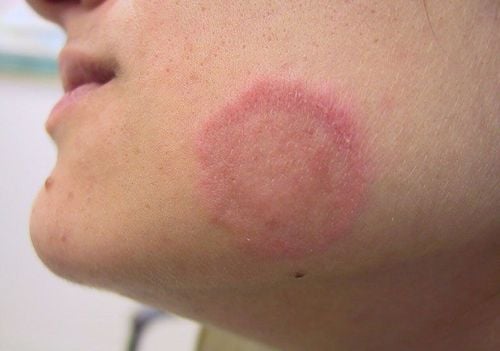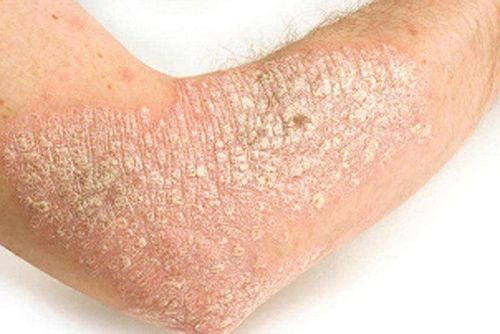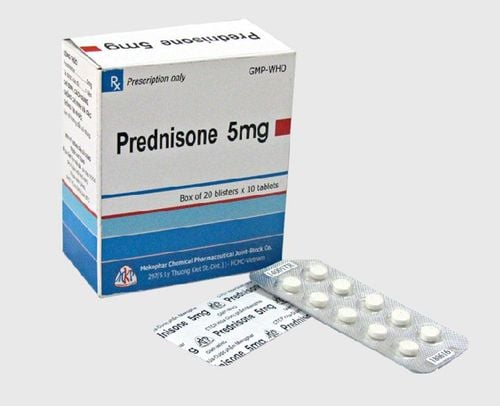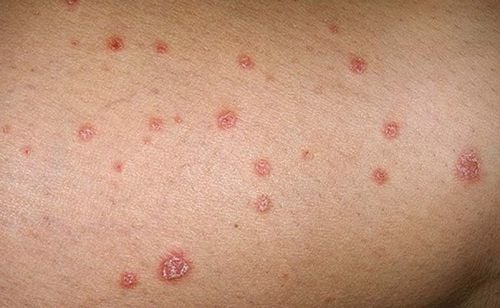This is an automatically translated article.
Topical corticosteroids are medications prescribed to treat psoriasis that reduce inflammation and itching. Treatment of psoriasis with corticosteroids can be combined with other treatments. However, this method can cause some side effects.1. Treatment of psoriasis with corticosteroids
Most patients with psoriasis are usually treated with topical medications. And the most common treatment is the use of topical corticosteroids. This is a powerful anti-inflammatory that can be used alone or in combination with other treatments. Many topical corticosteroids are commonly available with potency ranges from hydrocortisone being the lowest to clobetasol being the highest.
Topical corticosteroids are available in a number of products such as creams, ointments, lotions, sprays, shampoos... Through a selection of products available a corticosteroid along with a targeted treatment combination Targeting the lesion sites can bring the best treatment effect.
2. Mechanism of action of corticosteroids in the topical treatment of psoriasis

Thuốc corticosteroid
Corticosteroids bind to corticosteroid receptors and alter gene transcription. Corticosteroids have a four-ringed structure and modification of this structure affects the potency of the molecule. The potentiation of the molecule would be via binding actions of the corticosteroid receptor by halogenation with fluoride or chlorine at the 6 or 9 carbon positions of the corticosteroid.
The potency of topical corticosteroids is divided into 7 categories, where the mildest is number “7” including over-the-counter 1% hydrocortisone cream and the strongest is number “1” which includes stronger preparations such as clobetasol .
The first corticosteroid (hydrocortisone) is not strong. But, potent fluorinated (or chlorinated) corticosteroids are associated with a high risk for side effects. However, this is actually not due to the presence of fluoride (or chlorine), but to the molecule's ability to activate corticosteroid receptors.
Therefore, the efficacy and side effects of corticosteroids are related. So at any rate, a more potent topical corticosteroid (with or without fluoride/chlorine) will have more side effects.
3. Side effects of corticosteroids when treating psoriasis

Suy tuyến thượng thận là tác dụng phụ toàn thân hiếm gặp của corticosteroid
The main side effect is the limitation of topical corticosteroids. The serious side effects of corticosteroids are:
Skin atrophy Change in skin color. Therefore, patients should learn carefully before applying to avoid health risks.
Systemic side effects include:
Hypothalamic-pituitary-adrenal (HPA) axis disorders, Hormonal problems (Cushing's syndrome), adrenal insufficiency and femoral head necrosis . These side effects are less likely to occur with low-, intermediate-, or high-potency topical corticosteroids. Although, high potency topical corticosteroids can inhibit the HPA axis. However, it is still advisable to limit the amount of drug applied which will likely help limit the risk of systemic effects.
The rate of side effects increases with the strength of the drug as well as the duration of treatment. Therefore, it is important to use corticosteroids as prescribed and there should be no "more is better" concept.
Some common side effects of topical corticosteroids include:
Tingling sensation, Erythema, acne, stretch marks in the armpits or groin, Easy bruising or tearing of the skin, skin discoloration or discoloration darkening, enlarged blood vessels, localized hair growth..., can even develop pustular psoriasis. Causes health problems such as: high blood pressure, increased blood sugar. More serious symptoms may occur in the weeks or months following treatment. It is important for patients to stop treatment and report any abnormalities to their dermatologist.
One thing to be especially careful about when using topical corticosteroids to treat psoriasis is not to stop using them suddenly. Because, if you stop using it suddenly, it can make psoriasis flare up. Therefore, to avoid this, the doctor will gradually reduce the dose used.
Any questions that need to be answered by a specialist doctor as well as if you need to be examined and treated at Vinmec International General Hospital, please book an appointment on the website for the best service.
Please dial HOTLINE for more information or register for an appointment HERE. Download MyVinmec app to make appointments faster and to manage your bookings easily.
Article referenced source: webmd.comSEE MORE:
Notes when using Corticosteroids in children Why are corticosteroids a "double-edged sword"? Corticosteroids are in what drugs? How to know













